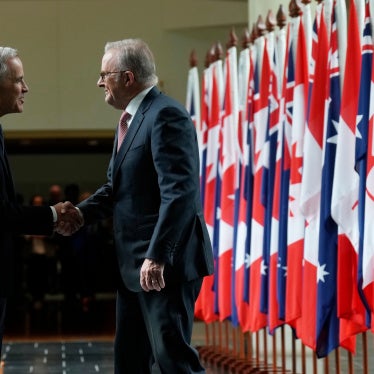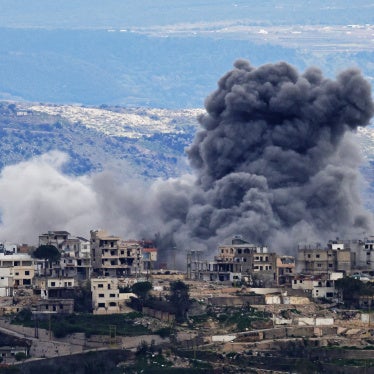Ever since the Chinese Communist Party's near-death experience in 1989 -- the last time it faced anything close to the mass popular protests witnessed in recent weeks in the Middle East -- the rulers in Beijing have taken no chances when it comes tosocial movements. So when an online appeal calling for Chinese citizens to emulate the revolutions in Tunisia and Egypt actually translated into gatherings of half-curious, half-prudent onlookers in Beijing and a handful of other cities two weeks ago, the authorities reacted swiftly.
Several Internet users who had relayed the appeal on microblogs, such as Twitter, were arrested for "inciting subversion," a state security crime. Police rounded up, detained, or placed under house arrest more than 100 people nationwide. Three prominent lawyers who had been taken away by the police in Beijing on Feb. 16 and 19 have yet to reappear. Another lawyer who turned up at a tentative gathering in the southern city of Guangzhou on Feb. 19 was beaten up on the spot and then also disappeared by the police. In Sichuan province, two well-known bloggers andcivil society activists, Chen Wei and Ran Yunfei, were arrested, also on Feb. 19. Chen is under investigation for the crime of "inciting subversion," the offense for which Nobel Peace Prize laureate LiuXiaobo was sent to prison for 11 years in December 2009; Ran is under investigation for "subversion," which carries a maximum penalty of life imprisonment.
Beijing didn't stop there. The Chinese government simultaneously deployed thousands of uniformed and plainclothes police at the sites of the gatherings and strengthened its censorship of Twitter-like services and virtual social networks. It also sought to suppress foreign media coverage by having the police harass foreign journalists, physically assaulting several of them, including BBC correspondent Damian Grammaticas, when they turned up this past Sunday, Feb. 27, to see whether the anonymous online call to organize weekly "protest walks" had attracted any participants. Official media coverage of Middle East events has downplayed demands for democracy and human rights, explaining the crisis as a consequence of the hike in food prices.
By now, countless observers have pointed to the vast differences between the situation in China and that in the Middle East to explain why protests are far less likely in the East Asian giant. While unemployment rates have ballooned and economies stagnated in the Middle East, for example, many Chinese have experienced two decades of gradual but substantial improvements in their livelihoods. Revolution won't spread to China, goes the conventional wisdom, as long as the economy keeps humming.
But Beijing's sledgehammer response has left many people wondering just how paranoid and insecure the leadership is about the risks of instability in the country. If the Chinese government resorts so readily to measures that are clearly overkill, doesn't it indicate a fundamental lack of confidence in the real stability of the country and the legitimacy of the ruling party. As Mao Zedong famously said, "A single spark could set the prairie alight." Surely a regime truly confident in itslegitimacy and achievements would not feel the need to respond in such a disproportionate way.
There is some truth to this counterargument. The Chinese leadership is nervous, especially about the number of protests every year -- 80,000, according to government statistics. But to attribute this paranoia to the events in the Middle East is to misunderstand the Chinese government's point of view. From Beijing's perspective, Tunisia, Egypt, and Libya were failed authoritarian regimes. China is a successful one. In the same way that the example of failed democracies doesn't dissuade democrats in places where free and liberal institutions function reasonably well, Chinese leaders don't think the Middle East situation applies to them. Their systemdelivers growth, is free from foreign influence, puts capable people in positions of power, doesn't require military rule behind the scenes, keeps political opposition to a minimum, and doesn't hold elections that need to be rigged. Or so they say.
If anything, however, the lesson the rulers in Beijing are drawing from the Middle East is that they have it right. Thekinds of challenges they face -- cooling off the economy while creating millions of new jobs every year, rebalancing growth and reducing disparities, urbanizing tens of millions of rural migrants every year, and building a welfare state -- are not inherently political. They are technocratic. The only political debates within the party leadership are about timing and priorities within the existing system, not about if or when to start a democratizationprocess.
In fact, the crackdown witnessed over the past few weeks is more a show of force than anything else: The party is confident it can arrest, detain, disappear, and put under house arrest an ever-growing number of activists without having to pay a price in the international community. And, unfortunately, Beijing seems to be correct about this.
After all, what penalties have been imposed on the Chinese government for having detained Liu Xiaobo's wife since October without legal justification, an unprecedented event in the entire history of the Nobel Peace Prize? Is the Chinese government paying any price for the thuggish treatment of the blind legal activist Chen Guangcheng, imprisoned at his home since he was released from prison last September? Has any foreign government expressed public concern at the alarming news that Hu Jia, the health rights advocate and laureate of the 2008 Sakharov Prize for Freedom of Thought, will also suffer house arrest when he is released from prison this June? Has any government expressed public disquiet at the enforced disappearance of no less than four prominent rights lawyers -- including Teng Biao, a 2007 recipient of the French Republic's human rights prize and a lecturer at one of China's top universities? The list could go on, but the answer is always the same: No.
The silence of the international community actually encourages Beijing to continue to lower the threshold oftolerance it has for activists in the country, contributing to the rise of the security apparatus in recent years. The battle lines are increasingly clear: the security barons, who oppose legal reforms, versus the citizens who are increasingly demanding precisely such change.
And here lies the real source of anxiety of the Chinese leaders: Nothing short of a communications revolution is taking place on their watch, radically transforming social attitudes and expectations. Mobile phones and the Internet are profoundly transforming how citizens see themselves and their degree of tolerance for the arbitrariness shown by the state. Legal awareness is turning into legal activism, and growing expectations reflect the fact that China can no longer shut out its citizens from the global community and from major international developments. The Great Firewall is hardly an impermeable barrier these days.
For the political police, this revolution is creating growing headaches. Stationing a few policemen at the door of a dissident and monitoring his phone was enough to silence him in the past, but today nothing short of a kidnapping will effectively take an activist off the grid. Twitter has become the virtual heart monitor of civil societyactivists across the country; a silence of a few hours is enough to spread the news of a likely arrest by the police. In that sense, the large-scale clampdown prompted by calls for a Jasmine Revolution shows that the police are beginning to lose the information battle.
Even if the kind of mass popular protests witnessed in the Arab world in recent weeks are still far off in China, the growing chasm between the facade of a "harmonious society" and amuch more checkered reality will inevitably lead to greater social volatility. As the Chinese government faces the inevitable weakening of its control over information, there is a great risk that it will choose to further empower the security apparatus to crack down on protesters, civic activists, and legitimate expression of dissent. The fact that the total budget for domestic security is now as high as the budget for national defense, according to a study by Beijing's Tsinghua University, certainly points in this direction.
The real antidote to either an uprising or a dangerous crackdown would be to rekindle a legal reform process that would open the way to genuine respect of the fundamental rights of Chinese citizens and the progressive curtailment of the arbitrary power of the state. That is something that has become, if not an immediate demand, at least a shared longing in Chinese society. The rulers in Beijing would be well advised to take note before today's murmurs of unrest turn into a roar.
Nicholas Bequelin is a senior researcher in the Asia Division of Human Rights Watch.






